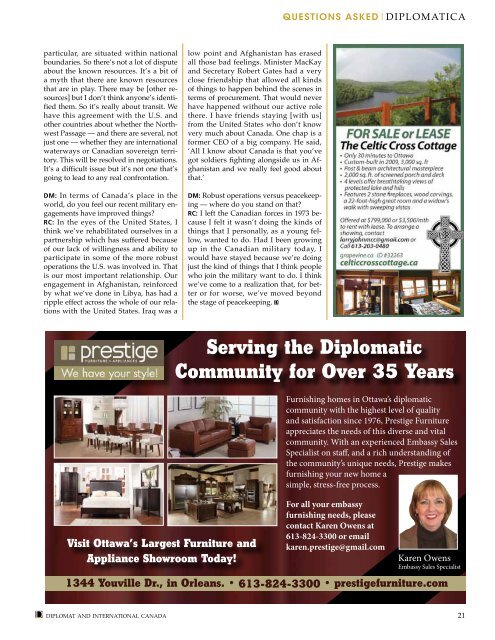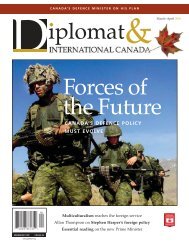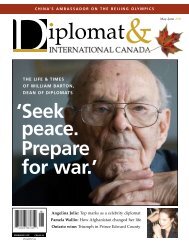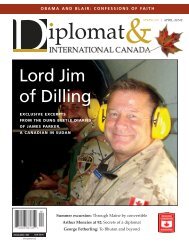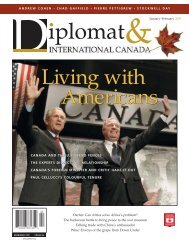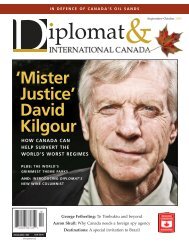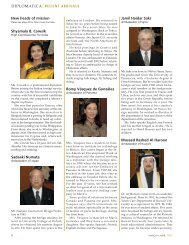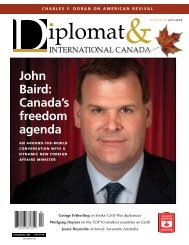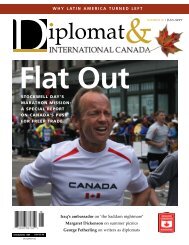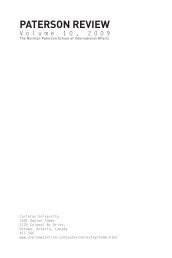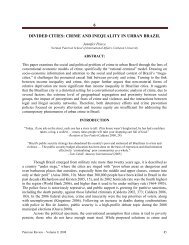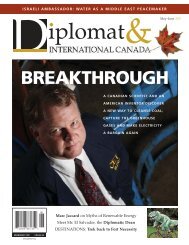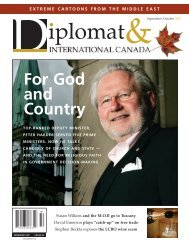the new petro power paradigm - Diplomat Magazine
the new petro power paradigm - Diplomat Magazine
the new petro power paradigm - Diplomat Magazine
Create successful ePaper yourself
Turn your PDF publications into a flip-book with our unique Google optimized e-Paper software.
QUESTIONS Asked|DIPLOMATICA<br />
particular, are situated within national<br />
boundaries. So <strong>the</strong>re’s not a lot of dispute<br />
about <strong>the</strong> known resources. It’s a bit of<br />
a myth that <strong>the</strong>re are known resources<br />
that are in play. There may be [o<strong>the</strong>r resources]<br />
but I don’t think anyone’s identified<br />
<strong>the</strong>m. So it’s really about transit. We<br />
have this agreement with <strong>the</strong> U.S. and<br />
o<strong>the</strong>r countries about whe<strong>the</strong>r <strong>the</strong> Northwest<br />
Passage — and <strong>the</strong>re are several, not<br />
just one — whe<strong>the</strong>r <strong>the</strong>y are international<br />
waterways or Canadian sovereign territory.<br />
This will be resolved in negotiations.<br />
It’s a difficult issue but it’s not one that’s<br />
going to lead to any real confrontation.<br />
DM: In terms of Canada’s place in <strong>the</strong><br />
world, do you feel our recent military engagements<br />
have improved things?<br />
RC: In <strong>the</strong> eyes of <strong>the</strong> United States, I<br />
think we’ve rehabilitated ourselves in a<br />
partnership which has suffered because<br />
of our lack of willingness and ability to<br />
participate in some of <strong>the</strong> more robust<br />
operations <strong>the</strong> U.S. was involved in. That<br />
is our most important relationship. Our<br />
engagement in Afghanistan, reinforced<br />
by what we’ve done in Libya, has had a<br />
ripple effect across <strong>the</strong> whole of our relations<br />
with <strong>the</strong> United States. Iraq was a<br />
low point and Afghanistan has erased<br />
all those bad feelings. Minister MacKay<br />
and Secretary Robert Gates had a very<br />
close friendship that allowed all kinds<br />
of things to happen behind <strong>the</strong> scenes in<br />
terms of procurement. That would never<br />
have happened without our active role<br />
<strong>the</strong>re. I have friends staying [with us]<br />
from <strong>the</strong> United States who don’t know<br />
very much about Canada. One chap is a<br />
former CEO of a big company. He said,<br />
‘All I know about Canada is that you’ve<br />
got soldiers fighting alongside us in Afghanistan<br />
and we really feel good about<br />
that.’<br />
DM: Robust operations versus peacekeeping<br />
— where do you stand on that?<br />
RC: I left <strong>the</strong> Canadian forces in 1973 because<br />
I felt it wasn’t doing <strong>the</strong> kinds of<br />
things that I personally, as a young fellow,<br />
wanted to do. Had I been growing<br />
up in <strong>the</strong> Canadian military today, I<br />
would have stayed because we’re doing<br />
just <strong>the</strong> kind of things that I think people<br />
who join <strong>the</strong> military want to do. I think<br />
we’ve come to a realization that, for better<br />
or for worse, we’ve moved beyond<br />
<strong>the</strong> stage of peacekeeping. D<br />
diplomat and international canada 21


